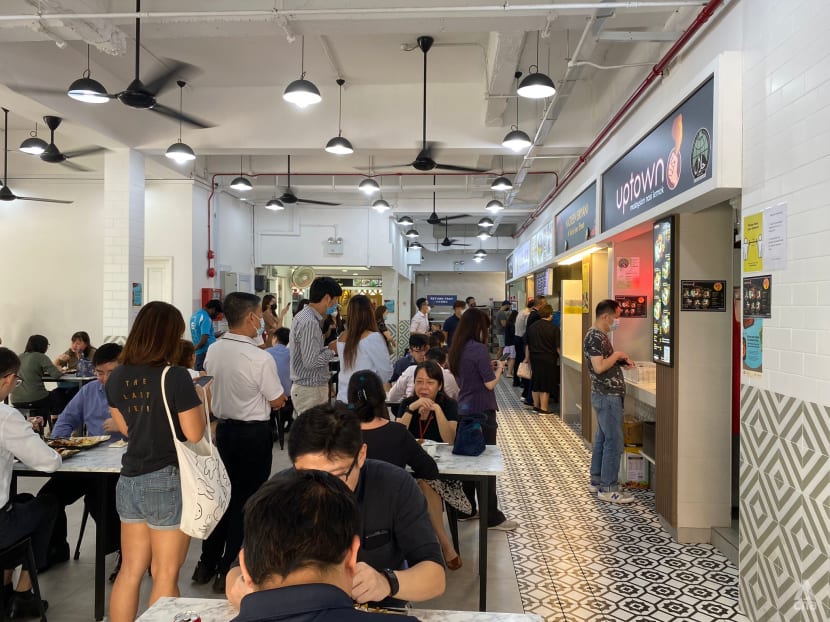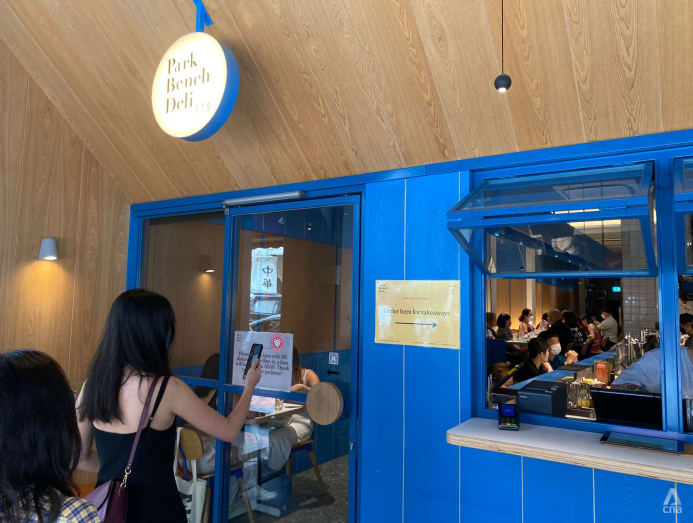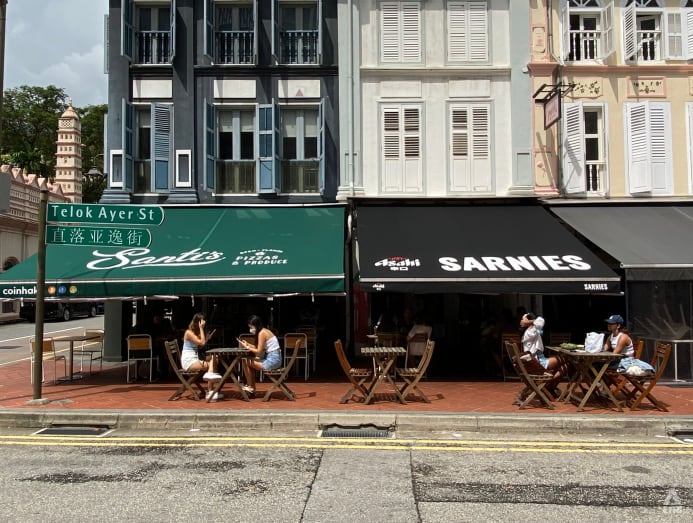Crowds return to office areas as Singapore marks the end of work-from-home default
Ad
Singapore
Crowds return to role areas as Singapore marks the end of piece of work-from-dwelling default

Office workers at Telok Ayer Coffee Shop on Jan three, 2022. (Photo: CNA/Grace Yeoh)
SINGAPORE: Darren Low, a 28-year-quondam lawyer who has been working from home since Singapore's stabilisation phase in September, is looking forward to returning to his workplace.
From this week, he will exist heading into the role on alternate weeks.
Although interaction with his colleagues in the office will all the same be limited due to safe management measures, he's happy to be seeing them once more.
"I guess for me, the social aspect of physically working in the office is quite important for the kind of work that I do. Of course, the social interactions will be quite limited, simply then yous'll nevertheless be able to see and talk to people," said Mr Low.
"Personally, I have quite good relationships with the people on my team, and then it does help, especially for things similar mental health as well. For us, it'due south quite a young part environment, and the nature of the work is relatively stressful, then it really helps to be able to speak to people, to see people in the form of working."
This month, up to 50 per cent of employees like Mr Depression who can piece of work from home volition be allowed to render to the role, the Ministry of Health (MOH) said in December when it announced the easing of the default work-from-dwelling house posture.
Mon (Jan three) marks the first weekday of 2022 back in the office for employees who are now allowed to return.
Ms Ng Meishu, who works in investor sales, volition be returning to the part every day from Monday. Since she is in a client-facing role, she was given priority to be function of the returning 50 per cent.
Similar Mr Low, she was previously working from home and merely went back to the office a few times in the by few months for meetings.
"Ultimately, depending on the job, contiguous (meetings) definitely can't really exist replaced. And in terms of collaborations, it's so much easier to talk contiguous," said the 26-year-old Ms Ng, whose office is in the central business commune.
"We still have to be adaptable and flexible, information technology'southward non really a preference for which 1," adding that both working from home and the office have their pros and cons.
UPTICK IN Business concern FOR F&B, TRANSPORT
When CNA visited bell-ringer centres in the CBD at lunchtime on Monday, several stalls had queues that stretched across 10 people. Small restaurants and cafes were also packed.
Some concern owners told CNA that the lunchtime crowd was slightly busier than on an average Mon.
Even Indonesian restaurant Pagi Sore at Telok Ayer Street had to bargain with a back-to-work crowd despite it not being open on Mondays.
When work-from-home was reinstated in September last yr as the default arrangement for those who were able to work remotely, Mondays became what its chef Park Tan described as "dead boondocks kind of days".
They then decided to close every Mon due to manpower issues and because they "don't know what to wait", the 33-year-sometime added.
But on Mon, Mr Tan received a pleasant surprise. While debating whether he should block off his online delivery, since his physical eating house was close, his squad received several orders for bento lunch sets.
"At that place were quite a handful of orders that came in before nosotros airtight the system. And so we came to the restaurant simply to fulfil the bento orders," he said.
"The orders were going to different parts of the island, five to six different offices. It was a very skilful sign. It was a mix of excitement and relief after so many months of anxiety and stress."
Mr Tan was "quite sure" at that place would exist higher footfall tomorrow. Subsequently all, when his team was in the eatery preparing the bento boxes on Monday afternoon, people walking past were already checking if they could dine in.
"Merely it's a skillful sign to prove that people are back in the CBD (fundamental concern district). At least no matter what, (the footfall) would be better than what information technology was (when piece of work-from-abode was the default arrangement)," he said.
"Nosotros tin can't take our customers' support for granted, so work-from-home default or not, we are grateful that they kept our stoves and hearts on fire, whichever 'phase' we are in."
At that place is a "huge, startling deviation" between the lunch crowds when work-from-home is the default and when it is not, Mr Tan added. When workers were previously allowed to render to the office, his restaurant was likewise full during lunchtime.
"During COVID, when it was piece of work-from-home every bit default, it was quite pathetic. We'd only fill a handful of tables to half at nigh," he said, adding that his eatery can currently seat about 70 to 80 people, down from 120 pre-pandemic.
"Yous tin can go from zero to hero. The biggest fear is if (the rules are) going to restrict people from coming to eat. They're not going to purposely come up out here simply to eat. Merely for u.s.a., being smack in the center of the CBD, our business has e'er been the office oversupply," he said.
Taxi company ComfortDelGro also saw a "slight uptick" in passenger volume during Monday morning's rush hour, said the company's grouping primary for branding and communications Tammy Tan.
"The level seen today is even so far brusque of what it was pre-COVID. With the easing of safe management measures, as well as the festive period, we expect need to go on to climb slightly in the weeks alee, barring unforeseen circumstances," she added.
Grab has similarly seen a "steady increment" in demand for ride-hailing services since COVID-nineteen restrictions were eased in November and throughout the festive period, said a company spokesperson.
"We believe this elevated demand will continue as more people return to the workplace in the new year. Grab continues to uphold safety and hygiene standards and then that our commuter-partners and passengers are protected," said the spokesperson.
EMPLOYERS PREPARE FOR RETURNING WORKERS
As employees return to the workplace from January, employers are likewise working to keep up with rubber management measures and work out suitable arrangements for employees who accept been working from dwelling house for the past year.
Vaccination-differentiated measures at the workplace also kicked in on Jan one, putting Singapore "in a ameliorate position to ease the electric current default work-from-home posture", MOH said at the time of the announcement.
This means merely employees who are fully vaccinated or have recently recovered from COVID-nineteen are allowed to return to the workplace.
DBS' work-in-office measures are in line with the stipulated regulations, said a spokesperson for the depository financial institution.
"With the government assuasive up to fifty per cent of employees who tin can work from home to return to the workplace, the health and safety of our employees remains paramount fifty-fifty as we look forward to welcoming more than colleagues back in the new year," the spokesperson said.
UOB plans to gradually increase the number of people working onsite to allow upwards to 50 per cent of those who tin work from home to render to the office, said a spokesperson for the bank.
"As more than of our people return to the office, our priority is to protect their wellness and safety. As such, nosotros are maintaining staggered start times, lunch breaks and end-of-day arrangements for colleagues who work in the office," the spokesperson said.
"Vulnerable" employees including those who are pregnant, over 60 or have underlying medical conditions are encouraged to continue working from home if possible, the spokesperson added.
OCBC, which is also gradually increasing the number of employees in the office, has established staggered work hours, safe-distancing measures and split operations, said its head of group corporate security Francisco John Celio.
"We have been preparing our workforce for a flexible, hybrid work arrangement because we recognise the importance of face-to-face interaction in effective and meaningful collaboration, ideation and culture building," he added.
"As more of our employees return to office, we will ensure that we provide a safe and secure environment for them to work in, to enable them to provide the services that our customers need."
Recruitment agency Salt will have fifty per cent of its work-from-home employees returning to the office from Mon (Jan 3), said its APAC CEO Jacqui Barratt.
Of its 160 employees, twenty will exist returning to the part in ii groups of ten - each grouping will work in the role on 2 or three days each week on alternate weeks.
All returning employees must exist fully vaccinated and should also take antigen rapid tests before coming into the office, said Ms Barratt.
31-year-quondam civil servant Brandon's (not his real proper noun) function is still putting "testing measures" in place for the next eight weeks equally they return to the function, he told CNA.
Before this, his management has been "largely supportive" in ensuring they take "as safe as possible" a transition back to work. This would include flexible start and finish times, he said.
He was given 3 days a week to return to the office – but said it was up to each department to decide how they wish to deploy the teams.
"There is definitely that implicit understanding that nosotros'd need to come back on some of these days for face-time, only personally, my own bosses accept left it quite flexible for united states of america," he said.
However, he has "mixed feelings" nearly returning to the office.
"On one paw, being able to see colleagues and having that access to quickly talk over things and huddle is more efficient than trying to ready upward Zoom calls. But in that location is some nervousness (wondering) if this flexibility will only continue insofar every bit we are in the pandemic state of affairs and not a real shift to workplace flexibility," he said.

FLEXIBILITY, Contiguous INTERACTION
Flexibility likewise remains important for some workplaces, even as contiguous interaction is encouraged.
In the office, learning and sharing "naturally occurs" when employees are together, said Salt'southward Ms Barratt.
"People feed off each other's free energy. Likewise, for a number of (people on) our team, the office is their favoured workplace as they get defended time and infinite to do their function, particularly when they are sharing a house with multiple people," she said.
Even though their squad is returning to the office more regularly from Jan, Ms Barratt believes that the cardinal to the hereafter workplace is flexibility, she told CNA.
This goes across working from home or working from an office, and companies should instead provide a range of working arrangements that work for both the business and the individual, she added.
"Some people may prefer a condensed working week of four days per calendar week, others might like function-time or fully remote (work hours). There are so many means we tin can work, and I think it's of import to realise information technology's non one size fits all," said Ms Barratt.
Founder of software development bureau Sleek Digital, Lester Police force, said his firm will go along to work from habitation, with but half of his employees returning to the function every Friday for an in-depth, four to 5 60 minutes meeting.
Mr Police is considering a render to the part from February, when Singapore is "more than certain" near the Omicron variant situation and when all six of his employees have received their booster jab.
"Currently information technology's even so very shaky, we don't know whether it will spread more desperately. We have overseas partners which are quite desperately affected, so we still want to see if it's going to get worse before we try and commit to render to the office," he told CNA.
Before heading into the office every Friday for their weekly meeting, the iii returning employees have to take an antigen rapid test. The other three members attend the coming together on Zoom.
"(There's) quite a significant difference, drop in productivity when we work from home. But my squad is notwithstanding quite friendly, then sometimes they work after office hours if they work from home considering there'south no travelling time," said Mr Law.
While working from home, his squad generally worked longer hours but was "non then productive".
"Nosotros run software projects, so we do a lot of Zoom meetings, which is a hassle sometimes. Sometimes we only want to turn the chair and talk to someone, like 'Hey, help me solve this problem'," he added.
"At present nosotros don't have the ability to do this, so hopefully amend advice means better productivity means faster projects."
Employees CNA spoke to by and large agreed that working from the office was better for communication and collaboration.
"Let's say I want to explore something, it's and so like shooting fish in a barrel. Today, I met two of my colleagues to discuss work. And it'due south really so much more efficient to but speak, rather than if we endeavour to schedule a meeting online," said Ms Ng.
"Nosotros just walk effectually the office, and just grab people (to chat). It's definitely way more than efficient in that sense."
62-yr-onetime Steve Mohamad, who works in the banking sector, prefers to exist in the office. He has been working from the office every other week when work-from-home wasn't the default arrangement.
"Yous become to interact with your team more. I do miss the social interaction with staff. And it's an opportunity for staff to be mentored and coached. You can't do that working from home," he said.
"Information technology'south difficult… I mean, we all manage working from domicile. But that personal touch you miss … and some jobs specifically you demand to interact with your clients. Fifty-fifty though your clients are people from the same company, non external clients, you lot practice need that confront-to-face interaction."

"WILL MISS WORKING FROM Domicile"
Although there are perks to finally returning to the office, employees said they would miss some aspects of working from home.
Brandon has enjoyed working from home because he had access to lunchtime workouts and was able to take coffee breaks in the comfort of his own home, he said.
"It definitely beats trying to stay awake in the part while fighting the nutrient blackout," he added. "Simply having social work gatherings would be the thing I look forward to about. It'southward skilful to build that rapport face to face."
Sheryl (non her real name) is "nervous" to return to the role because it volition "take some time" to adjust to regular working hours. She also hopes public transport volition not be likewise crowded.
The 29-year-erstwhile lawyer will need to return to the office on a bi-weekly ground, with her office existence split up into two teams. She must also have an antigen rapid test (Fine art) earlier going to the office.
Working from home has been "relatively good", and she volition miss it, she told CNA.
"In that location is more freedom to do what I exercise and more than flexibility with time. A lot of time has been saved in not having to travel from home to office and vice versa," she added.
However, she is looking forwards to coming together with her squad face-to-face, which is important because of the nature of her work.
"It's been a difficult year transitioning in and out of work-from-home, so hopefully, this volition go more permanent then we are all able to accommodate and settle into a new norm," she said.
"The Omicron variant is a little worrying every bit it is much more than contagious. Even with condom distancing measures, I'm non sure if this will be enough."
Recent Searches
Trending Topics
Source: https://cnalifestyle.channelnewsasia.com/singapore/crowds-office-areas-return-end-work-home-default-singapore-297331



0 Response to "Crowds return to office areas as Singapore marks the end of work-from-home default"
Post a Comment